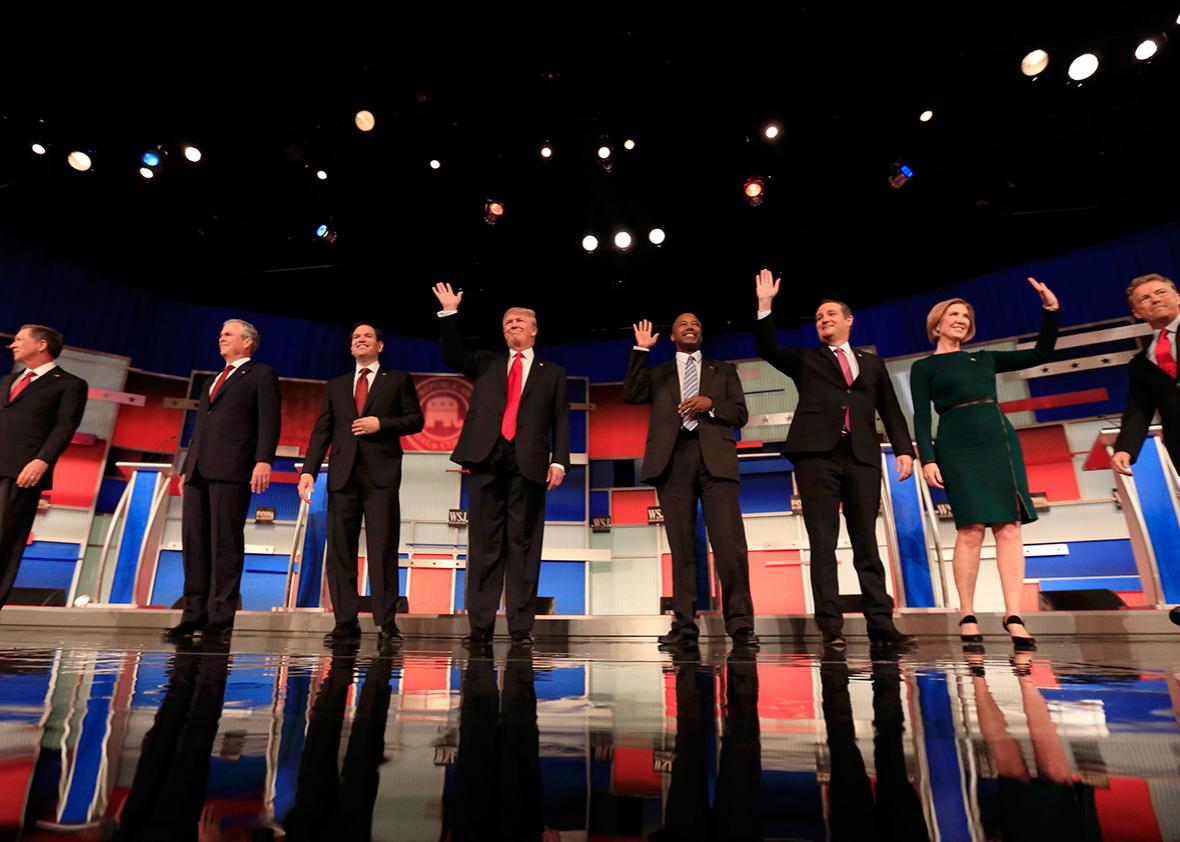There are a few things we can get out of the way about Tuesday’s Republican presidential debate. First, after months of decline, Kentucky Sen. Rand Paul had his first great night, challenging Sen. Marco Rubio on tax expenditures and defense spending, pushing Donald Trump on the Trans-Pacific Partnership, and stepping into his father’s role as the libertarian gadfly in the race. “If you’re a profligate spender and you spend money in an unlimited fashion for the military, is that a conservative notion?” Paul asked in his closing statement. “We have to be conservative with all spending, domestic spending and welfare spending. I’m the only fiscal conservative on the stage.”
Rubio, as usual, performed well. But his approach—shaping canned excerpts to questions and using replies to give condensed parts from his stump speech—has diminishing returns. For as much as it might impress new viewers, it’s a reminder that Rubio has nothing new to say. Sen. Ted Cruz as well tailored his stump speech to the questions at hand, but there were times when he went off script to mediate a fight—trying to stake a middle ground between Rubio and Paul, for instance—or make a sharp point. On immigration, for example, Cruz sowed the ground for an eventual attack on Rubio and Jeb Bush, who back reform in one way or another. “For those of us who believe people ought to come to this country legally and we should enforce the law, we’re tired of being told it is anti-immigrant,” said Cruz. “Every sovereign nation secures its borders, and it is not compassionate to say we’re not going to enforce the laws and we’re going to drive down the wages for millions of hard-working men and women.” No one on stage took a direct a swing at Rubio on immigration, but from that answer it’s clear Cruz is practicing.
As for the rest of the field, both Gov. John Kasich and Carly Fiorina gave decent performances that will keep them from sliding down in the pack, while Donald Trump and Ben Carson were just good enough to avoid damaging their brands and their standings. Jeb Bush still struggles with the format; at one point, he had a hard time telling a joke and eventually abandoned it to make another point. At the same time—and unlike the last debate—Bush didn’t do or say anything to tank his candidacy, which counts as a victory.
But this is all aesthetics. More significant for Americans were the actual views of the candidates. Tuesday’s debate, hosted by Fox Business, was on the economy. The first question of the night was on the fight for a $15 minimum wage, and subsequent questions dealt with tax cuts, job growth, and the Federal Reserve. In several places, the candidates showed disturbing ignorance of basic facts of the American economy. Paul, for example, blamed low interest rates for problems faced by the poor, despite all evidence to the contrary. Likewise, Bush attacked Dodd-Frank financial legislation for reducing capital requirements for banks, when the law does the opposite.
Even ignoring these flubs, misstatements, and half-truths, the GOP contenders were out of step with the actual economic needs of ordinary Americans. Each candidate talked about relief for workers and families, but outside of Rubio’s child tax credit, few offered it. Instead, candidates came out against raising the minimum wage, called for a new gold standard for currency, and pushed plans for massive upper-income tax cuts. Unlike the first Democratic debate—when Hillary Clinton, Bernie Sanders, Martin O’Malley, Jim Webb, and Lincoln Chafee tussled over college affordability and health care costs—there was little in the Republican debate that spoke to the challenges of ordinary people rather than businesses.*
Moreover—and more importantly for the politics of economic growth—the Republican candidates were silent on one of the key questions of the 2016 election. “The Democrats will inevitably ask you and voters to compare the recent presidents’ jobs performance,” said moderator Gerard Baker to Carly Fiorina. “In seven years under President Obama, the U.S. has added an average of 107,000 jobs per month. Under Clinton, the economy added about 240,000 per month; under George W. Bush, it was only 13,000 a month. If you win the nomination, you will probably be facing a Democrat named Clinton. How are you going to respond to the claim that Democratic presidents are better at creating jobs than Republicans?”
Fiorina dodged the question. She didn’t have an answer. And neither did anyone else on the stage. Later, moderator Maria Bartiromo threw Rubio a softball on Hillary Clinton. “Why should the American people trust you to lead this country even though she has been so much closer to the office?” His answer was smooth—“[I]f I am our nominee, they’ll be the party of the past”—but it ignored this basic question of economic performance.
This is a problem. Barring disaster, President Obama will finish his term with a growing economy. Republicans need to show Americans that they can do better—that they can deliver growth and resources to the people who need them. Otherwise, little else matters. The Democratic nominee will inherit the Obama economy and prevail.
Read more of Slate’s coverage of the GOP primary.
*Correction, Nov. 11, 2015: This article originally misspelled former Rhode Island Gov. Lincoln Chafee’s last name. (Return.)
